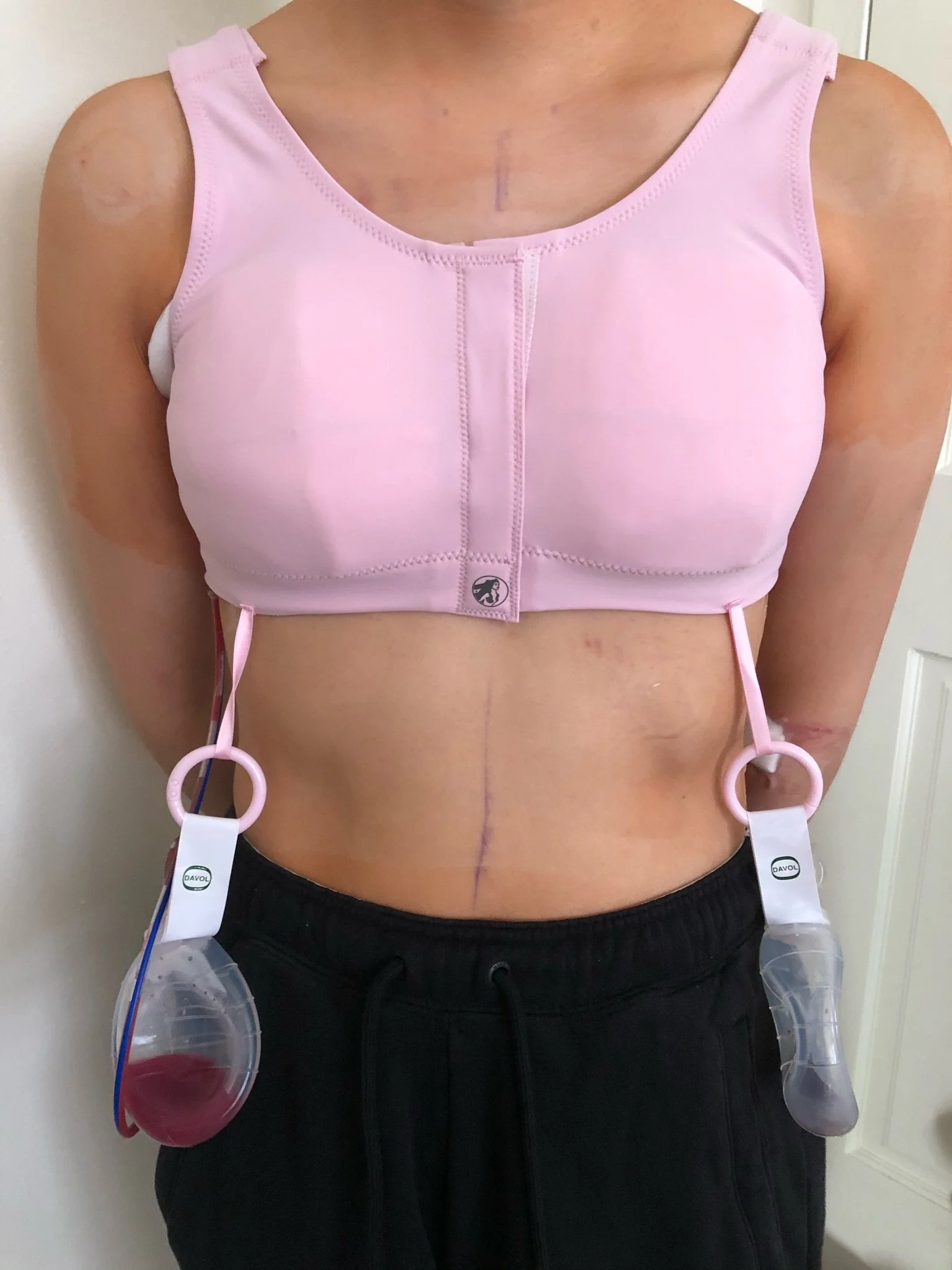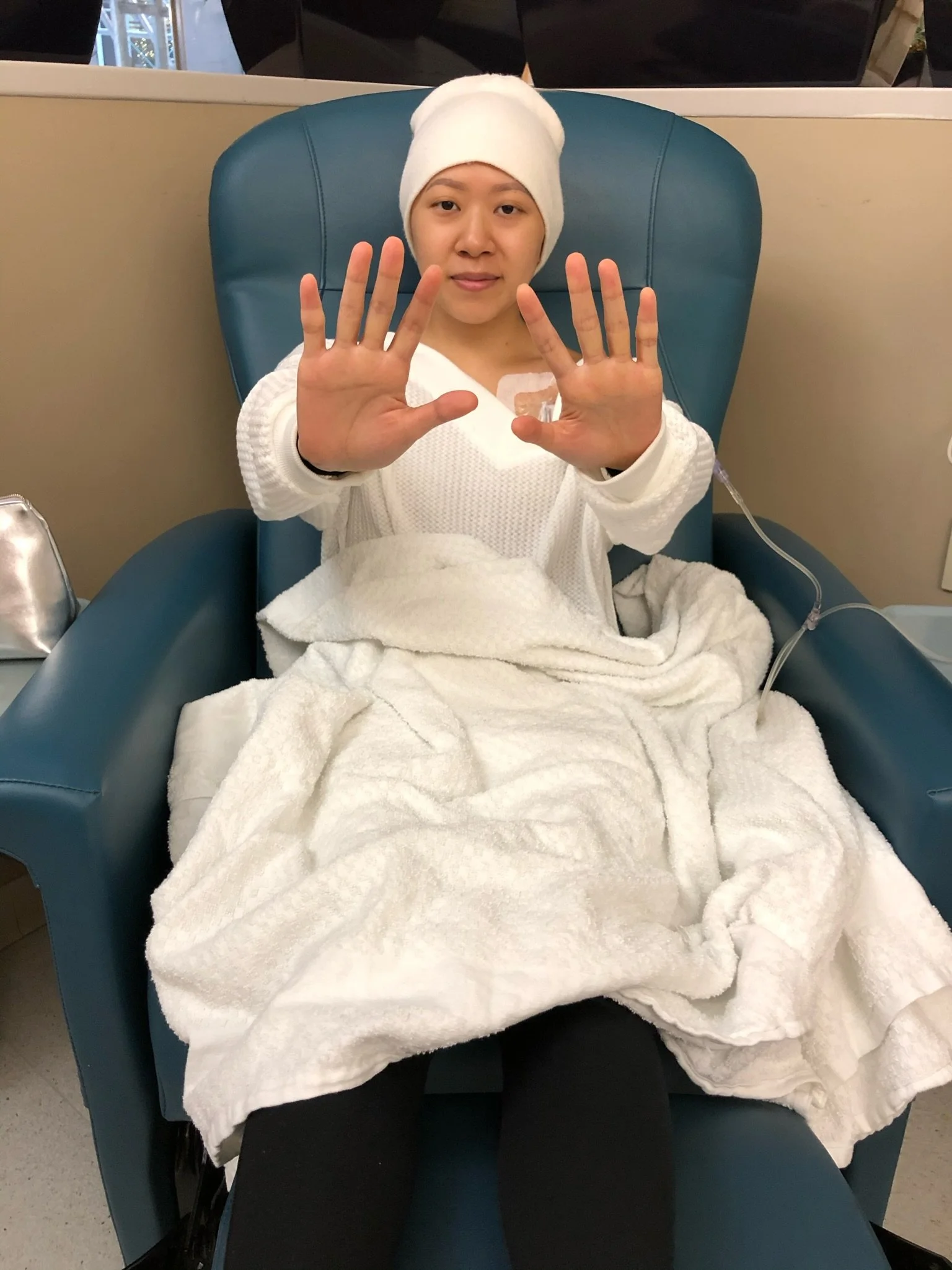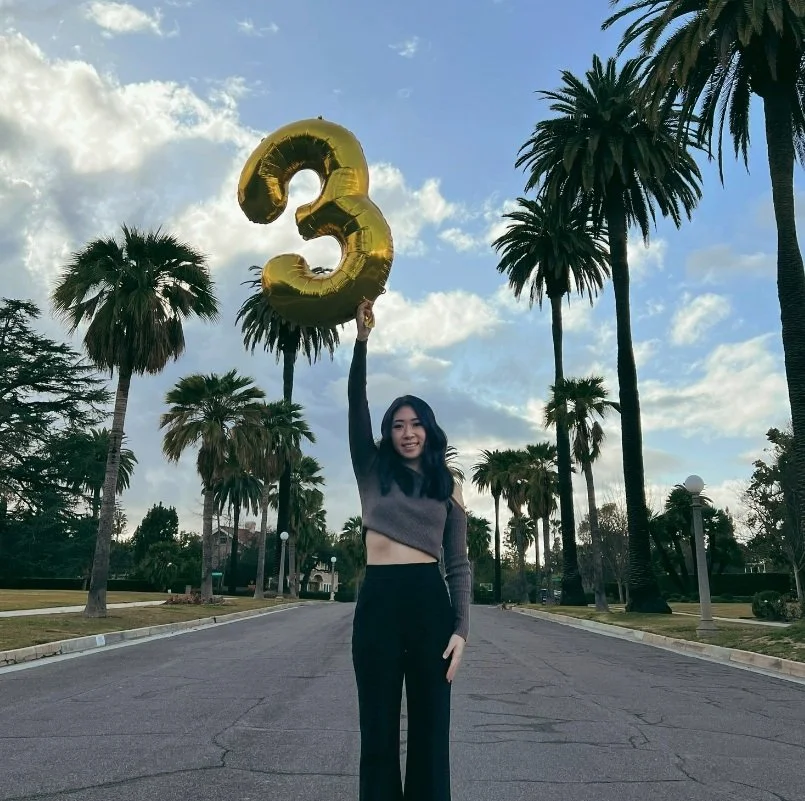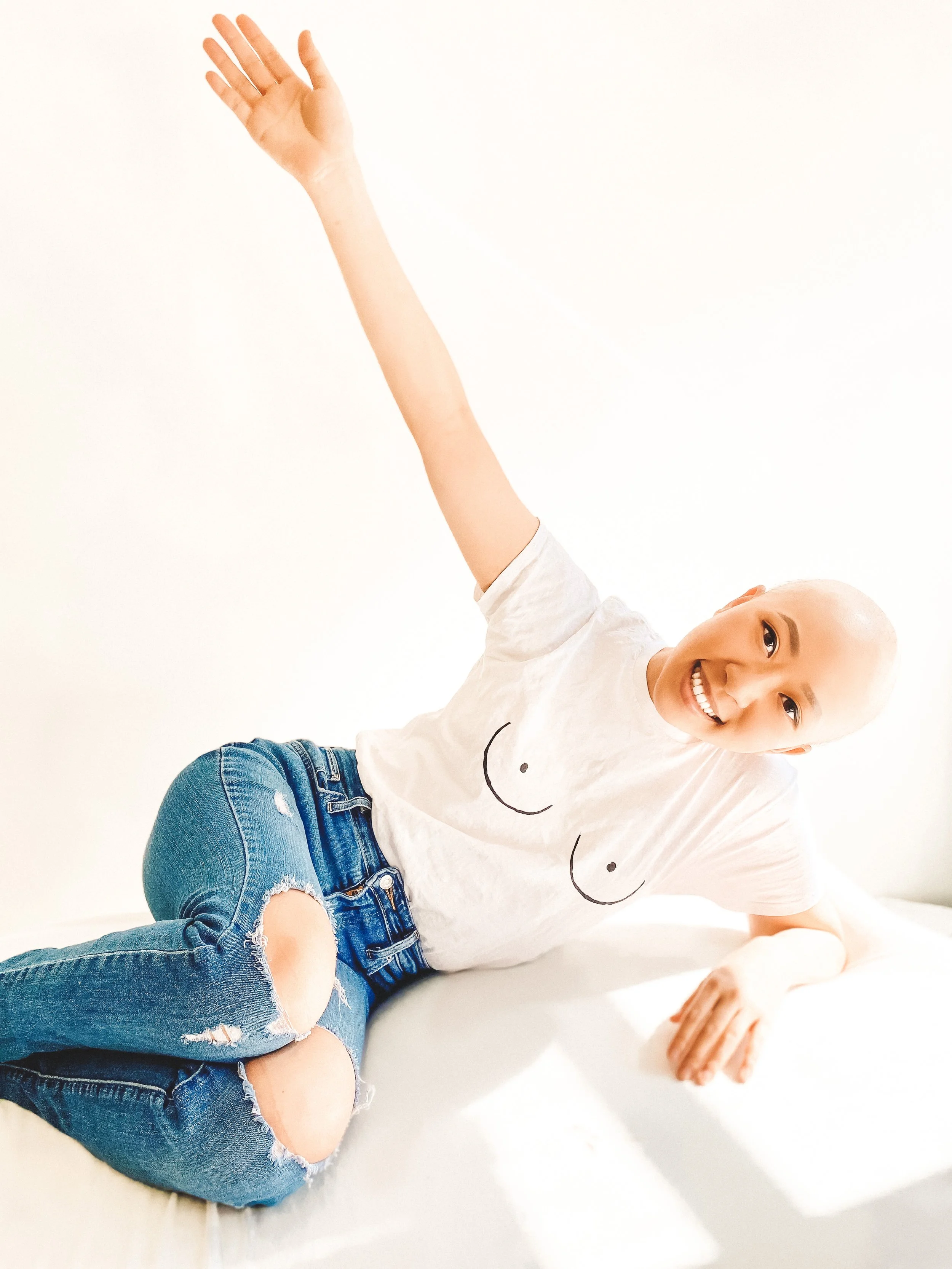What It’s Like Being Diagnosed with Breast Cancer Before 40
Written by Melissa Schenkman, MPH, MSJ
When Michelle Kang, MHA, was in her mid-20s she was “living the life” in New York City, one she had diligently worked very hard to build. By night, she was enjoying all the city had to offer with friends and her boyfriend, Paul. And by day, she was managing the business and operations of a cancer infusion suite in the heart of the city.
Her job exposed her to many individuals diagnosed with various types of cancer, but it was notable that the few women she encountered who had breast cancer, all were age 40 and above. This reinforced her prevailing notion that breast cancer predominantly affected older individuals with a family history.
So, with no history of cancer in Kang’s own family and believing breast cancer primarily had a hereditary and genetic basis, getting screened was not something on her personal radar, as a woman in her 20s.
That’s until one day while travelling to South Korea to show Paul her hometown, she felt something in her right breast. A few weeks later, she was diagnosed with breast cancer becoming that one in every 196 women in the United States under the age of 40 who receives a breast cancer diagnosis.
Kang was just 27 years old.
“Prior to my diagnosis, my understanding and awareness of breast cancer's occurrence among individuals under the age of 40 was pretty much nonexistent,” she said.
But unfortunately, she is far from alone.
In 2020 approximately 12,000 women younger than 40 years old received a diagnosis of breast cancer (which forms when breast cancer cells grow out of control).
With a diagnosis made through a combination of self-exams, annual mammograms, ultrasounds, and ultimately biopsies of breast tissue, breast cancer’s early warning signs—a breast lump or discharge—may be ignored by women under 40 because they think they are not old enough to get breast cancer. Making matters worse, sometimes even healthcare providers are quick to dismiss symptoms.
Risk Factors and Symptoms
According to the American Cancer Society, compared to women without a family history, a person’s breast cancer risk is about 1.5 times higher if you have one affected first-degree female relative and 2-4 times higher for women who have more than one first-degree relative.
So, while Kang is absolutely right that genetics (the BRCA 1 or BRCA 2 mutation) and family history are dominant risk factors, there are other non-hereditary factors that may increase younger women’s breast cancer risk including:
A personal history of noncancerous breast diseases (for example: breast cysts, fibrocystic breast changes, fibroadenoma, and calcifications)
Radiation treatments to the chest before age 40
Getting your period before age 12
Having never been pregnant
Dense breasts
Heavy alcohol use
High intake of red meat
Obesity
Race
For women of all ages though, symptoms and signs of breast cancer can include:
A breast lump or thickening that feels different from the surrounding tissue
Changes to the skin over the breast, such as dimpling
A newly inverted nipple
Peeling, scaling, crusting or flaking of the pigmented area of skin surrounding the nipple (areola) or breast skin
Redness or pitting of the skin over your breast, like the skin of an orange
Change in the size, shape or appearance of a breast
*If you are experiencing any of the above symptoms or other unusual changes in your breast, we highly encourage you to see a doctor and get checked out.
The problem for younger people is that we often see few people publicly talking about their experience or our true susceptibility to breast cancer. For Kang, that was her experience from day one.
“Following my diagnosis, I sought to enhance my understanding by turning to online resources, only to discover that the majority of available breast cancer information was tailored to individuals aged 40 and above,” Kang said. “The lack of reputable and relatable resources specifically catering to patients under 40 just stressed the uncommon nature of my breast cancer diagnosis at the age of 27, leaving me overwhelmed with feelings of hopelessness and uncertainty concerning my future.”
Michelle Kang, MHA, is a New York City and Los Angeles-based breast cancer survivor, thriver, and oncology manager who works very hard to make a difference in the lives of cancer patients.
Prior to her own diagnosis with breast cancer at age 27, she received her Master of Health Administration at Columbia University Mailman School of Public Health.
Diagnosis
As uncommon as the nature of Kang’s diagnosis, so too, as often is the case in millennials and Gen Z, was her path to receiving it–one that would not have happened at an early stage without her tremendous self-advocacy.
After feeling the lump in her breast while in South Korea–a country with universal healthcare–she stopped by a primary care office that took walk-ins. The doctor looked at her breast lump, touched it with his finger and declared: “It’s eczema-related.” He recommended she see a dermatologist, which she did. Memorably, the dermatologist pulled out a magnifying glass, looked at her lump, said ‘Don’t worry,’ and prescribed her some cream.
To note, two weeks before feeling the lump in her breast, she had also been to her OB-GYN for a routine exam, who gave her a clean bill of health.
But Kang’s gut instincts were going off like fireworks. Combined with her health administration background, she knew what the doctors were telling her was not right. So, when the doctors’ offices in New York City opened the next morning, she made international calls to set appointments upon her return. She then tried to make the rest of her trip memorable for Paul and herself.
Upon returning to the US, she received the standard diagnostic tests for detecting breast cancer–a mammogram, an ultrasound, and breast biopsy. On July 17, 2019, her life changed forever when she found out her instincts were right: she was diagnosed with breast cancer. Stage 1B hormone-positive breast cancer to be exact.
“Accepting and processing my diagnosis was very challenging,” Kang recalled. “I shared it only with my immediate family, my boyfriend, Paul, (who moved in with me, becoming my main caregiver) and a select and trusted circle of close friends. By choosing to limit my disclosure, I knew I could count on them to provide the type and level of emotional support that I needed.”
She also told a few of her work colleagues but had major concerns about how this would impact her professional life.
”I wished to uphold my professional image, concerned that revealing my health condition might cast doubt on my ability as a rising professional. Additionally, I was apprehensive about my identity being defined by my illness,” Kang said.
Each person she chose to share her diagnosis with became a vital link in Kang’s chain of support, helping her during treatment and to not let her illness define her as a person.
Michelle after her double mastectomy surgery wearing a specialized bra and with Jackson-Pratt drains.
After a double mastectomy, this type of drain plays an important role in healing, as it prevents uncomfortable buildup of fluid at the surgical site and prevents infection.
It’s recommended for the drains to be emptied twice a day and that patients keep a record of the amount of fluid that accumulates.
Treatment
For women diagnosed with Stage 1B hormone-positive breast cancer, like Kang, there are several types of treatments involved and decisions to make.
Stage 1B means a breast cancer is either 0.2 mm - 2mm or that there is no visible tumor in the breast tissue but it’s in nearby lymph nodes. Any hormone-positive cancer, like Kang’s necessitates treatment with hormone therapies that block certain hormones from increasing cancer cell growth.
“My comprehensive care team walked me through my range of options and explained the pros and cons of each,” Kang said. “To ensure I was confident with my decision-making, I sought second and even third opinions from different medical professionals spanning multiple health systems. Their consensus gave me confidence in shaping my choices.”
Her treatment plan was:
● Egg retrieval procedure - to preserve her ability to have children
● Double mastectomy
● Four cycles of adriamycin-cytoxan chemotherapy - damages DNA preventing cell replication
● Ten rounds of taxol chemotherapy – interferes with cancer’s growth and spread
● Breast implants via plastic surgery
The toll her treatment—including 14 rounds of chemotherapy—took was both physical and emotional.
Michelle during one of her many chemotherapy treatments. Patients wear cold caps on their heads while receiving chemotherapy, as these caps have been found to significantly reduce hair loss by slowing blood flow to the scalp.
“Although opting for a double mastectomy was a sound decision in terms of my health, the experience of losing my breasts evoked a sense of incompleteness within me and profound sadness,” Kang said. “To be candid though, the prospect of losing my hair weighed heavily on me, even more so than the loss of my breasts. I always had a strong attachment to my long and thick hair, considering it a defining feature.”
She struggled with chemotherapy-induced nausea, which predominantly manifested on the day of treatment and the subsequent day. To mitigate this, she received acupuncture, used fragrance-free products, and prepared less fragrant meals.
There also lies a dimension less frequently acknowledged – the emotional and mental facets of the journey, Kang said. These proved to be significantly more demanding.
“Prior to my cancer diagnosis, I had never encountered a continuous stream of unfavorable news, nor had I faced such a persistent succession of challenging days and emotional breakdowns. Throughout the intensity of cancer treatment, it seemed as though each day brought another instance of loss, compounding upon one another and always creating an overwhelming feeling of bleakness regarding my future.”
She is currently in the midst of her ten-year hormone therapy journey—a daily dose of Tamoxifen alongside a monthly injection known as Lupron—both medications that reduce the risk of recurrence of hormone-positive breast cancer like Kang’s.
Life After Breast Cancer
The typical image of cancer patients celebrating and ringing a bell after completing treatment that you see didn't apply to Kang’s experience. Although being declared cancer-free is a significant milestone worth celebrating, she didn't feel that sense of joy deep down. She often found comfort in actively fighting the cancer during treatment.
“Once treatment was over, it felt like my safety nets had been taken away, and I was expected to resume my life as a fundamentally changed person carrying the weight of raw trauma,” Kang said. “My biggest challenge during the transition from active treatment to post-treatment life was the constant fear of cancer recurrence. This fear often overwhelmed me to the point where I struggled to function during the day.”
Her priorities, professionally and socially, have shifted.
“Before and during my cancer journey, I managed the daily operations of a cancer center in New York City. My priorities revolved around creating efficient business workflows, devising strategies to get the most financial return on investment, and being the best leader for my staff. After my diagnosis, my top priority was the patient experience,” Kang said.
It prompted her to take a leap of faith and move to Southern California for a new job as a patient experience manager. In this role, she has an amazing opportunity to use her personal experiences and professional skills to impact patients across an entire cancer health system and not just one cancer center.
She also has learned to embrace resting—something she was not accustomed to or comfortable with before treatment.
“In my twenties, I was the biggest social butterfly, always immersed in the lively scene of New York City. My calendar brimmed with events, parties, and gatherings on weekdays and weekends alike,” Kang said. “My apartment seemed like a place just for sleeping, as I was rarely there. But now, I feel like an entirely different person.”
She has come to appreciate being a homebody and engaging socially on occasions with those who truly matter in her life.
Michelle celebrating three years of breast cancer survivorship in January 2023.
Advice from a Breast Cancer Survivor
If Kang could go back in time, she would tell herself, “You are not alone.” Unfortunately, at the time of her diagnosis and treatment, that’s exactly how she felt.
Regardless of whether you choose to share your diagnosis or not, she urges individuals to find support - through your loved ones, a therapist, or the breast cancer community. It’s crucial, and please do not forget there exists a community of young adults who have or have had breast cancer—something she wish she had known sooner.
“There's a certain comfort in knowing you're not the only one dealing with an uncontrollable situation. If you look hard enough, you can discover stories that deeply connect with your experiences and offer the hope you seek,” Kang said. “I wish I had, as it felt incredibly isolating at the time.”
Kang also offers this advice to women who have recently been diagnosed:
Advocate for yourself
“We often hear the phrase ‘advocate for your health,’ but I believe it should go beyond that—“advocate for yourself.” When you receive a breast cancer diagnosis at a young age, there can be a misconception that others know what’s best for you. It’s crucial for you to stand up for yourself, both within and outside the doctor’s office. Whether you’re dealing with an erroneous medical bill, seeking workplace accommodations, or needing support from loved ones, your voice carries significant weight.”
Aim for courage
“I lost track of how many times I had moments of breaking down, crying, and feeling unsure about my future. There were instances where I felt utterly defeated. I found it impossible to be constantly strong and maintain a positive outlook all the time. Instead of striving for perfection, I’ve come to realize the importance of aiming for courage. Being courageous means facing negative feelings head-on and taking steps forward despite them. While it might not always feel like it, courage is what ultimately builds resilience over time”
Michelle after completing her initial phases of treatment with surgery and chemo. She now uses her voice to spread breast cancer awareness through her website, https://www.breastregardsmichelle.com and on Instagram and TikTok where you can follow her inspirational journey, travels, and everyday millennial lifestyle fun @michellekang.
Conclusion
Kang’s breast cancer diagnosis shattered her original beliefs that hard work would always lead to success, as she was confronted with a constant stream of bad news and the reality of plans gone awry.
“The most challenging part of my breast cancer journey wasn't losing my hair, amputating my breasts, enduring chemotherapy, or going through the treatments. It was the profound loss of many things that once shaped who I was. As an independent rising professional in New York City, suddenly being bedridden and dependent on others was challenging,” Kang reflected.
“My dreams were put on hold, and the future I had worked tirelessly for seemed out of reach. Some of my closest friends failed to show up, and their absence during this time felt like a devastating blow.”
Yet in the midst of it all, she discovered the power of courage to propel her forward.
“When so much of who you are is stripped away, you are forced to dig deep within yourself and rely on what remains. Cancer may have taken a lot from me, but it never took away my courage,” Kang said. “This remaining remnant of my old self is what reminded me to live a more intentional life, fight on my own terms, and find joy in the wins that can emerge even after significant losses.”
While she kept her diagnosis largely private during treatment, now, using her voice to raise awareness of breast cancer in young women has become her biggest priority outside of her job. She created her own website, www.breastregardsmichelle.com, where she chronicles her journey.
“I vividly recall the moments after my diagnosis, scouring the internet for resources tailored to young adults like me and struggling to find relatable stories from other women who shared my age and experiences. This experience led me to a realization: sharing my own story could potentially offer hope and solace to at least one young woman facing a similar journey,” Kang said.
“Today, I stand tall as a survivor with this new perspective, embracing my new sense of self and living a life filled with intention, gratitude, self-love, and of course, courage.”
For support groups and an excellent list of financial assistance programs for young women with breast cancer, visit the Young Survival Coalition.
Subscribe to the YMyHealth newsletter to stay up to date on everything that’s health-related for millennials!







